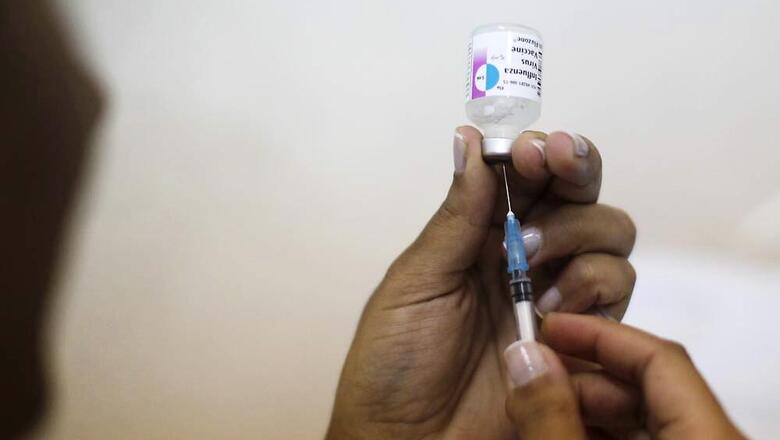
views
The week between April 24 and April 30 is marked as World Immunization Week. India has already weeded out Polio but several other life-threatening diseases remain. What should be the next priorities? Virologist and pediatrician Dr. Jacob John shared his perspective with IBNLive readers for an interaction on the issue.
Q. Sir, I am a Physician. Every year in India a number of Patients especially Pediatric die due to viral diseases eg meningitis, encephalitis, RTI, GI Inf etc. In majority of cases no bacterio/micro diagnosis is established. Don't you think we need to focus on that rather than treating with unnecessary antibiotics? Asked by: Dr Ketan
A. There are, as you rightly pointed out, a number of diseases and outbreaks of which the exact causes remain undiagnosed; in many cases they are called simply viral. What we need is better laboratory diagnostic services to identify their causes, like in all countries in which health management is on scientific lines. In the absence of diagnosis of causative agents, many call them viral but give antibiotics, jut to be on the safe side. This leads to overuse or rather misuse of antibiotics. The problem is rampant in India and needs special attention
Q. What are the challenges of introducing new vaccines in our national programme? Our national programme still seems to be stuck with basic vaccines Asked by: Karen D'souza
A. Introduction of new vaccines require careful epidemiological measurement of target diseases by diagnosis of causative agent (disease burden) and economic analysis of benefits against costs. For health economics analysis also disease burden data are necessary. These two skills or competences are very weak in our Immunisation Division of the Ministry of health and Family Welfare. Therefore expert opinion is taken and experts often do not agree. So by default new vaccines are slow to be introduced. But we have introduced hepatitis B, Haemophilus influenzae b and Japanese encephalitis vaccines in many states, some states or many districts. Other vaccines are waiting at our doors
Q. After polio eradication, according to you, what should be the next priorities in India? Asked by: Rohit
A. There are two avenues to build on our success. One, to target more diseases for eradication: measles and rubella are the "natural" next two, as they fulfill criteria of eradicability. The second avenue is to build upon our health management system so as to control many neglected diseases or those that have failed to come under control -- TB, malaria,typhoid fever, and many more. Some like pneumococcal diseases and Rotavirus diarrheas are vaccine-preventable -- we have to learn to use these vaccines in the national immunisation programme.
Q. We hear a lot of news about vaccines causing deaths. Are vaccines really safe? Asked by: Kriti
A. Very important question indeed. We have a relatively high infant mortality rate, under-five mortality rate and even some deaths in adolescents -- this may be called the "background noise". Is every such death explained by cause? No. In any time interval some children die. Post-vaccination interval is no different. Take for example an infant with "sudden infant death" or "crib death" -- if vaccine was given prior to such death, vaccine would be blamed but if vaccine was not given, the death would not come to media attention. There have been instances of some drug in the refrigerator picked up (by negligent staff) and given instead of vaccine -- or vaccine diluent -- and the death following such drug reactions (overdose) is also attributed to "vaccination". Vaccines are safe, they are licensed on the basis of documented safety; in rare instances children may have allergic reactions -- that should be diagnosed and treated and should not be allowed to progress to death. Such deaths are unnecessary and due to program weaknesses. I have even seen snake-bite death, suicide and drowning reported as "adverse reaction to vaccine" only because they happened after vaccination. Sequence does not mean consequence. Vaccines save lives. A robust healthcare delivery system is necessary for us to prevent deaths and find out causes of deaths when they happen.
Q. What lesson could we learn from the polio program? Asked by: Tara
A. Many lessons are inherent in our successful polio eradication programme. One, where there is will, there are ways. Ambitious target set, political will ensured, no stone left unturned, all functionaries worked in unison, accurate records were kept, good diagnostic lab support was ensured, detailed planning -- macro and micro level -- was done and adequate budget was provided. Another lesson, we do have the capacity to tackle any health-related problem, if we plan well. The legacy is a cadre of excellently well trained personnel in the eradication programme. If we apply such principles as I said above, we can certainly control TB, malaria etc. Improving routine vaccination coverage is eminently feasible if we factorise our success factors. Success has a tendency to breed further success.
Q. Is there anything called over-vaccinating a child? Can it be harmful? Asked by: Radhika Arora
A. From a physiologic or immunologic perspective, there is no such thing as over-vaccination. If some one gives the same vaccine over and over again one could cause "over-vaccination" by overloading the cells that respond to that specific antigen. When we give multiple vaccines -- together if such are allowed, or sequentially as recommended, body cells respond withot interfereing with each line of response. The interesting point is that cells are pre-determined as to which antigen each will react to; there is no confusion at cell level. So no chance of over-vaccinating" Look at it another way; how many microbial infections does a child encounter in infancy? About one hundred? To each the infant would have responded immunologically. How many vaccines do we give? ten? fifteen? Proportionately insignificant number!
Q. How can Government address the issue of low awareness of immunisation and misinformation about vaccine? Asked by: Deepika Shergill
A. When you look at at immunisation coverages we see some patterns. States with higher literacy rates have higher coverages. Within communities, in children of families with literate/educated parents coverages are much higher than those in illiterate ones. The lesson is general education is a vehicle of information on child protection including immunisations. The best method of awareness creation is one on one. ASHA and Anganwadi workers etc must teach mothers. In urban communities we do not have ASHAs but we do need some counterpart workers. At every opportunity -- child birth, clinic visits for illness, and so on, we must talk immunisation. Why should health-interventions not be included in formal curriculum in schools? Is there anything more important to teach than saving from disease, disability and death?
Q. Why health is never a priority area for our Governments? specially child health? Asked by: Mayank
A. "Human health is not a priority" is a strong statement, but unfortunately I do agree. There are several reasons -- let me touch upon one or two. There is a general belief that diseases are part of our karma or fate and money or governments cannot do anything about it. That human health is by and large in human hands is a lesson we should be convinced with. There is a general belief that each of us is in charge of our health -- since 18th century European cultures -- capitalistic, communism or socialism be their economic ideology -- have strongly believed that "the state is responsible and accountable for the health of the people". Our nation has no such ideology -- no political party has such a "western" ideology. Thirdly, there is a general belief that we save money by not investing in human health. Truth is we lose money by ill health. TB drains our economy of 27 billion dollars annually but we are so stingy we spend 200 million for its control. We have to learn (our political parties have to learn) that people create wealth and healthy people create more wealth. We are instead seen as consumers only -- hence the poor understanding of health economics is one major reason of low priority.
Q. What lesson could we learn from the polio program? Asked by: Tara
A. This was already answered. We need to act on lessons learned -- lessons alone are not enough. Most important lesson, we can achieve any health goal once we set our minds on it.
Q. Nobody knows about world immunisation week. is government doing anything to build awareness about it? Asked by: Rajdeep Sharma
A. You knew! Yes, we could do with more publicity and actions. The Government had declared 2012 (and extended to 2013) as Year of Intensification of Immunisation" Bihar has 4 Immunisation weeks per year. But still we should fall in line with World Immunisation Week,I agree
Q. Do social barriers work against getting our child immunized? Asked by: Navolina Mukherjee
A. The barriers are more in the "delivery" side -- timing of clinics, access, distance, information gaps -- general as to what vaccines against what diseases and specific as to where, whcih day, what time, -- and if you call them social, yes. They are more design weaknesses. Sure our immunisation programme could do with re-engineering. Imaginative and transformational changes are needed, not simply incremental changes.
Q. I must draw attention to this website http://www.immunizationinfo.org/issues/general/vaccine-misinformation . It busts many myths about vaccines. It helped me to immunise my child without worries. Indian Government should develop information sites like these to address vaccine myths. Don't you think? Asked by: Rajita Jaiswal
A. I agree Social/electronic media should be used more fully Dis-and mis-informations should be countered logically, systematically.
Q. What should the govt do to implement immunisation programmes in India? Asked by: Rohan
A. Our national immunisation programme dates back to 1978. A new model, fit for 21st century, with Inputs with monitoring; Processes with auditing and Outcome with measurement are to be built in. What is the outcome? One disease reduction; that is not measured. Two demand creation: there is hardly any sign of it.r
Q. Is the vaccine responsible for some of the current deaths reported in the media? if yes, then why are we introducing these new vaccine without adequate data and research Asked by: Dr. Parthasarathy Gogia
A. No vaccine, to my knowledge is responsible for deaths that have been alleged to be caused by vaccinations. All vaccines are registered after careful scrutiny of safety data.
Q. What is pentavalent vaccine? I hear it is for pneumonia. where is it available? Asked by: Rajeev Saluja
A. Five components in pentavalent are -- diphtheria-whooping cough-tetanus (these are in triple vaccine) plus hepatitis B vaccine plus Haemophilus influenzae b vaccine. The last one Hib bacteria cause meningitis and pneumonia.


















Comments
0 comment